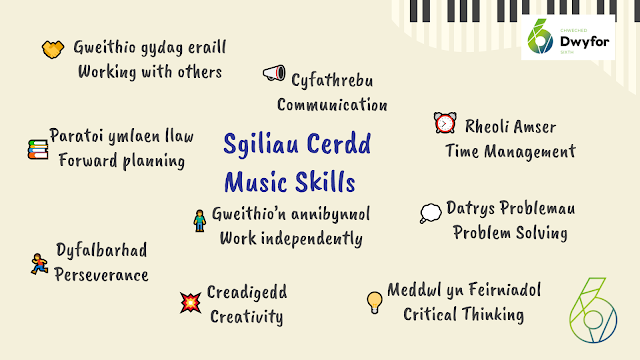Pam Astudio Cerdd? || Why Study Music?
Dwi wedi bod yn meddwl yn diweddar, beth ydy'r pwynt astudio cerddoriaeth? Na, dwi ddim yn cael creisis, dim ond meddwl pam mod i wedi ei astudio? Beth sy'n ei wneud yn bwnc apelgar? Pam fasa cyflogwyr eisiau cyflogi rhywun sydd wedi astudio cerdd lefel A, neu gael gradd yn y pwnc?
Un o'r rhesymau nes i ddewis astudio cerddoriaeth ydy'r amrywiaeth sydd i'w gael wrth astudio perfformio, cyfansoddi ac arfarnu. Mae'r cyfleoedd am brofiadau amrywiol yn golygu nad ydy'r pwnc byth yn mynd yn ddiflas, heb sôn am yr amrediad eang o gerddoriaeth sydd ar gael i'w astudio.
Felly, dyma restr o'r sgiliau mae astudio cerddoriaeth yn ei ddatblygu a sut mae hynny'n digwydd yn eithaf naturiol o fewn y pwnc:
Gweithio gydag eraill - perfformio mewn ensemble, trefnu digwyddiadau.
Cyfathrebu - trafod wrth arfarnu yn y dosbarth, cyfleu neges wrth berfformio.
Rheoli Amser - cadw trefn ar nifer o agweddau gwahanol o'r gwaith gan roi tasgau mewn mewn pryd, ymarfer a mynychu gwersi offerynnol.
Datrys Problemau - wrth ymarfer offeryn neu lais, canolbwyntio ar rannau anodd o'r darn, meddwl am ffyrdd i'w wella, wrth gyfansoddi, dewis yr arwydd amser cywir a'r y cywair iawn i'r darn.
Meddwl yn Feirniadol - gwrando yn astud wrth arfarnu cerddoriaeth, gwrando ar berfformiadau wrth ymarfer ac adnabod lle i wella, gwrando ar gyfansoddiadau ac adnabod y ffordd ymlaen gyda'r dasg.
Creadigedd - casglu syniadau cyfansoddi, creu perfformiadau, ysgrifennu am gerddoriaeth.
Gweithio'n Annibynnol - ymarfer offerynnol, ymchwilio a gwrando ar gerddoriaeth, datblygu cyfansoddiadau.
Dyfalbarhad - gweithio yn ddygn ar ddarnau perfformio, canolbwyntio ar gwblhau cyfansoddiad, drafftio traethodau ar gyfer arfarnu.
Paratoi Ymlaen Llaw - ymarfer ar gyfer perfformiadau, yn y dosbarth cerdd paratoi ar gyfer gwersi semniar.
Faswn i wrth fy modd yn trafod mwy o hyn, neu os oes gen ti gwestiwn pellach am astudio cerdd gyrra neges i mi ar g.pritchard@gllm.ac.uk
==============================
I've been thinking lately, what's the point of studying music? No, I'm not in a crises, just wondering why I studied it? What makes it an appealing subject? Why would employers want to employ someone who has studied A level music, or got a degree in the subject?



Comments
Post a Comment